The fact of the matter is that there’s no way you’ll be financially free unless you get out of debt.
Financial freedom is, after all, the ultimate goal. The point where you have enough money to live the life you want to have.
The exact amount you’ll need differs from person to person but at the end of the day – breaking news – you need to save a set amount to get there.
So logic tells us that there’s no absolutely no way for someone to be financially free while they have debt.
Consequently, we should all be doing everything we possibly can to get rid of it.
Check out these related articles:
- FAQs on Getting Out of Debt ASAP
- The One Principle That Will Guarantee Your Financial Future
- The Only Tip You Need to Reach Financial Freedom As Soon As Possible
- Financial Freedom is Totally Achievable. Here’s How.
- How to Think Like a Future Millionaire
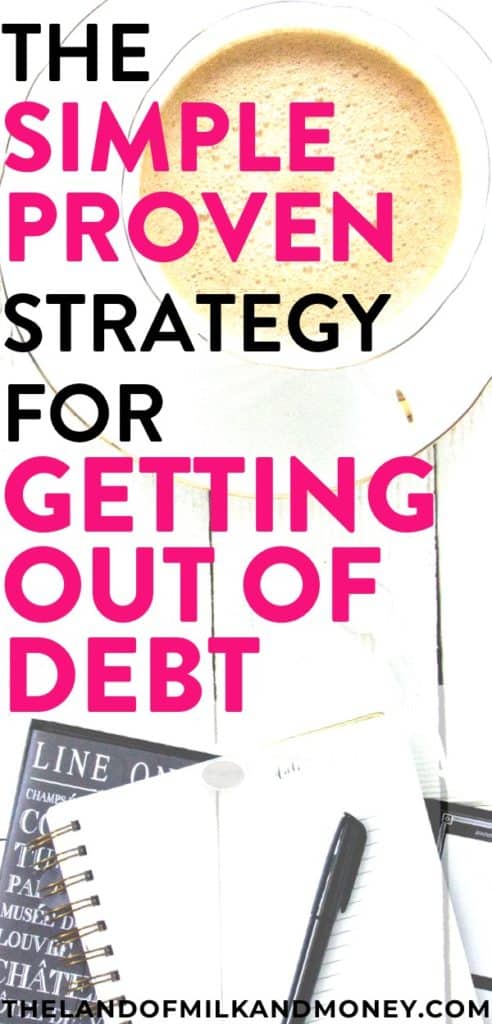
This is clearly not the “normal” way of thinking. After all, the US as a whole is in incredible amounts of debt:
- $12.84 trillion of total household debt – an average of $137,063 per household
- $8.69 trillion of mortgage debt – an average of $182,421 per household
- $1.34 trillion of student debt – an average of $50,626 per household
- $1.19 trillion of auto debt – an average of $29,539 per household
- $784 billion of credit card debt – an average of $16,883 per household
Want to hear a scary conclusion from that article? The total debt owed by Americans has surpassed the amounts owed in December 2007. And we all know what a fun time came after that.
Perhaps even scarier from an individual perspective? On average, you are likely paying around $1,300 in credit card interest per year.
Think about that! That’s in addition to what you actually owe. Think of all the lost income you could be earning if that money was working for you!
We often talk around here about how saving as much as possible is the key to being financially free, to which some people have responded that they’re already living at the very limits of their income, there’s no way they can cut out even more etc etc.
Yeah, I call BS. Because I bet those people have a credit card. And I bet they consider waving goodbye to more than $100 per month in interest as a normal part of their budget.
Which it absolutely shouldn’t be.
I’ve heard the arguments, especially these days when interest rates are lower than average.
It’s “good debt”. I’ll “pay it off before interest rates rise” (i.e. the point of being totally frigging screwed). I’m “paying the minimum repayments as that’s all I can afford” (also one step off the point of being totally frigging screwed).
So what the hell are you going to do when (yes, when) interest rates rise and you can no longer afford those repayments?
And then there’s the worst one: “I can’t even meet the minimum repayments and I’m incurring more debt to pay off this debt.”
Which is a sound the alarm, F5 tornado-level of a financial emergency.
So for all you holding any sort of debt: You do realise that you’re incurring massive amounts of interest that is essentially you kissing goodbye to your money, right?
To which the response is almost always: “Yes, but I can’t afford to pay more.”
At which time I might look around to check there are no witnesses (because I’m not a complete idiot), smack you on the side of the head, grab you by the shoulders, look you in the eye and calmly say:
“Sorry, Peter Pan. It’s time to grow up.”
You Need To Change Your Thinking
Before taking any steps to address the debt itself, you need to address the mindset that got you into this position in the first place.
1. Debt Is Not Normal
The first thing you need to realise is that, despite what the world tells us, having debt is not normal.
We’re told that the only way to go to university is to take out astronomical amounts of student loans. Because forcing 18 year olds to make enormous financial decisions is a great idea, obviously.
Advertisements scream at us to get a new car or a new TV at 0% interest for 18 months. What a deal! Until the 18 months is up and you’re completely screwed.
Companies aren’t offering these kinds of deals out of the goodness of their hearts! They’re offering them because it allows them to inflate the prices of the goods beyond levels that people can afford to pay upfront.
The same goes for universities. I thank the finance gods every day that I didn’t go to college in the US – not because it doesn’t have some of the best universities in the world, it absolutely does, but the fact they can charge the amounts that they do is a blatant crime.
It’s obvious though why it costs so much more in the US than every other developed nation: because the sheer level of student loans on offer allow these colleges to inflate their prices beyond what anyone should consider normal.
But it’s not normal.
And you’ll never, ever be financially free until you realise that.
2. You’ll Never Be Financially Free While You’re In Debt
We’ve discussed what financial freedom entails on this site before. As per that article:
“The end goal should be to have enough money to give yourself the options to do those things that you can’t do now.”
And what’s one of the key benefits of financial freedom?
“It’s earning enough passive income to be able to change jobs or start a business or even continue in your current job without fear of being fired. Essentially, it’s being able to do the work you want to do, not the work you have to do.”
That includes no work at all. Living the dream!
But how can you have enough money to not be afraid of being fired if you’re handcuffed to your debt?
When I was researching the figures above about the current average household debt, one of the articles had the headline “Household Debt is Enslaving Americans”.
And that’s absolutely what it is: enslavement.
After all, it means that you have to keep generating enough income to not only live, but to pay off your debt – AND any interest repayments.
This means that while you have debt, you are effectively required to keep working. That is, you aren’t able to do the work you want to do (or none at all), but ONLY the work you HAVE to do.
You’re also probably not able to save anything. This means that you’re effectively sentencing yourself to working forever just to survive, rather than saving up enough to one day be financially free.
This is not to mention all of the other ways that debt can negatively affect your life. It’s the leading cause of relationship stress. It makes you twice as likely to suffer from depression. It significantly increases the likelihood of you engaging in self-destructive behaviour, including alcoholism and abuse of medication. Or, ironically, shopping.
People deal with this through being angry, being scared, or being in denial. None of those things are good for you.
And none deal with the problem at hand.
3. Every Dollar Spent On Interest is Another Dollar Not Being Put Towards Your Financial Freedom
This was touched on above but is definitely worth reiterating.
The average interest rate on credit cards is 12.77%. So let’s assume that you hold the average household credit card debt of $16,883 and aim to pay it off in five years.
Using this calculator, we see that this would require payments of $382.16 per month. But this isn’t the figure that should make your blood run cold.
That privilege is reserved for this: this would include interest over the five years of $6,046.21. This means that you’d be paying off a total of $22,929.21 for your $16,883 debt.
How do you feel about oh-so-generously giving 26% of your hard earned cash to your bank?
Does it help if I tell you that those monthly repayments of $382.16, if invested at an annual rate of return of 8% for the same five year period, would leave you with $22,929.60 – or almost exactly the total amount that you would pay to the bank for that debt?
Would you rather be $22,929 towards or away from your financial freedom?
It’s a hard question. I’ll give you a moment.
…
So now that we’ve clarified that debt is bad for your present and absolutely terrible for your future. Are you ready to do something about it?
How To Get Out Of Debt
It’s very straightforward to do. Not easy and not necessarily fun. But extremely simple. Here’s how.
1. List all of your debts
Every single one of them.
Your student loan, credit card debt, mortgage, car loan, any personal loans – anything at all.
You need to include the following columns in your list:
- Description of the debt
- Total debt
- Interest rate
- Minimum repayment amount
2. Re-order them in order of interest rate
That is, the debt with the highest interest rate – not the amount of the debt – should be at the top of your list.
3. Pay the minimum amount required for each debt
We are all for facing your problems head on around here. So if you incurred the debt, you have to pay it. As such, it’s important that you meet your minimum obligations for each debt.
4. Do absolutely everything you can to put more money towards paying off the debt with the highest interest rate
Some people advocate paying off the smallest debt first to give yourself a “mental win” as you eliminate one and then move on to the rest. This is called the “snowball method”.
I, however, don’t agree with this. We’re all adults here. You don’t need “mental wins” – you need to save as much money as possible.
And paying off the debt with the highest interest rate first means that you are effectively saving yourself from paying more interest than you have to. Your money is thus being far better utilised by allowing more of it to go towards paying off the principal of each debt.
This will, in turn, allow you to pay off all of your debt quicker.
Remember when I told you to grow up earlier in this post? This is the time to do so.
Especially when it will save you literally thousands of dollars and months of repayments.
(This calculator allows you to see how each debt repayment method would work out for you. Plug in your numbers and see your results, although I guarantee that the one I’ve indicated above – also known as the “avalanche” method – will be the financial winner.)
So now that we’ve established your strategy for paying off your debt, how do you do it?
There are a mountain of ways to save money (many of which are listed here!) but the crux of it is: you have to do everything you possibly can.
Every non-essential expense should be eliminated.
Stop buying take away or going out for meals. Sell your extra car, downgrade your other one (or get rid of it all together) and start taking public transport or biking to work. Move into a smaller place to pay less rent – or sell your house and downsize. No more daily lattes. Review all of your ongoing bills (cell phone, cable, internet), get rid of the ones you don’t actually need and look into different companies or different plans for the ones you do. Cancel your gym membership.
You also need to do everything you can to increase your income. Make money on the side. Start selling anything you don’t strictly need. Look for a new job – or take a second one.
You should be doing everything you possibly can to dig yourself out from under your mountain of debt.
This is especially true if you are taking on more debt just to sustain your lifestyle or to pay off existing debt.
Remember that F5 tornado-level of a financial emergency? You have to do everything you can to get out of that or you will forever be stuck in a spiral of financial doom from which you will never escape. Keeping up with the Joneses is absolutely not worth the pain and hardship that you are inflicting upon yourself.
Start cutting out anything that you don’t absolutely need. It’s the only way.
As mentioned, it’s not going to be easy. But when you’re free from the shackles of your debt, you’ll only wish you’d started earlier.
5. Once the first debt is paid off, move on to the next one
So you’ve paid off your debt with the highest interest rate?
Congratulations! That’s amazing, seriously. Trust me when I say that your future self is on the ground, kissing your feet out of gratitude.
Now time for the next one!
Do exactly the same thing for the debt with the next highest rate of interest. And the next one. And the next one. Until they’re all gone.
And all of that money that you were previously spending on debt repayments? It’s now ready to be invested towards your financial freedom.
One Final Important Point
If you fully implement this strategy, I guarantee you that you will be setting yourself up to be free from the prison of debt that you’ve built for yourself.
However, you should also look long and hard at the circumstances that put you there in the first place.
Any sort of financial habit that has led you to spend more than you earn needs to be immediately addressed.
This is especially important to ensure that you don’t incur new debt after you’ve paid off your existing debt – or, even worse, to make sure that you don’t incur more debt while paying off the existing debt.
The habits set out in this strategy are fantastic for guaranteeing your financial future. For example, by cutting all discretionary spending during the debt repayment period, you’ll see that you are able to live your life even without all of these “extras”.
You can then maintain these reduced spending habits once your debt is paid off, so that you can maximise the amount of your income going towards your investments.
Because what you absolutely want to avoid is negating all of your hard work by re-entering the debt cycle once you’ve escaped.
This may involve having a frank discussion with your partner over how to cut back your family’s spending patterns. This is especially the case if it’s their spending, not yours, that put your household in this position in the first place.
While this may be a difficult chat to have, it’s nowhere near as hard as it will be to spend the rest of your life in debt.
After all, you want to be financially free!
And when it’s this straightforward to do, there’s absolutely no reason why you can’t be!

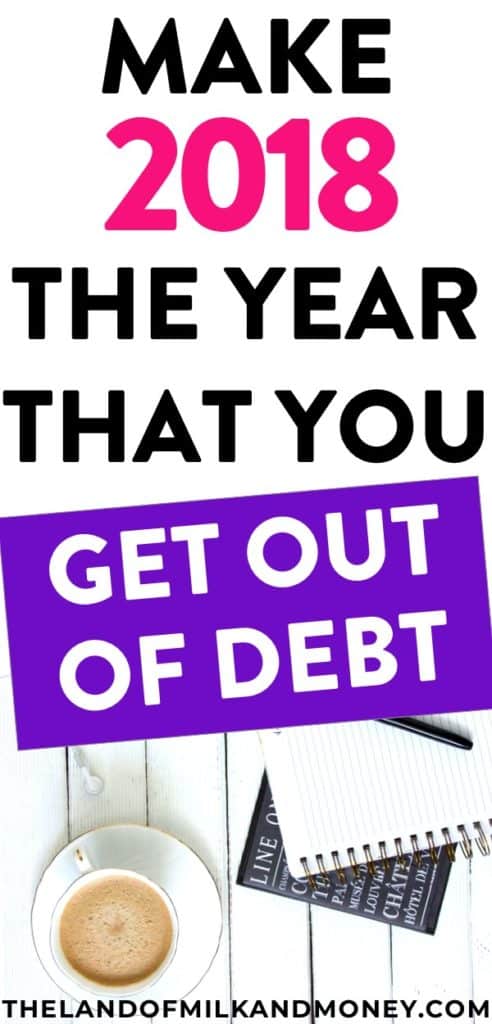
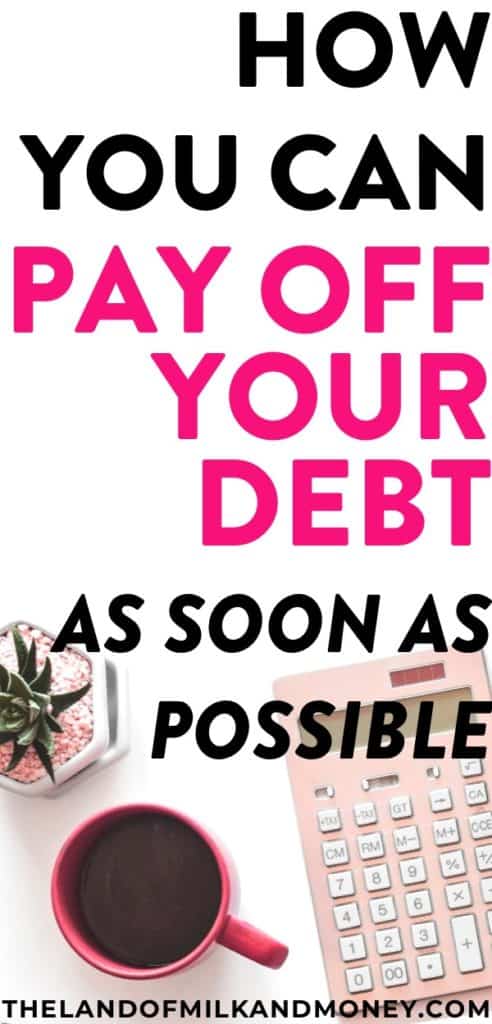
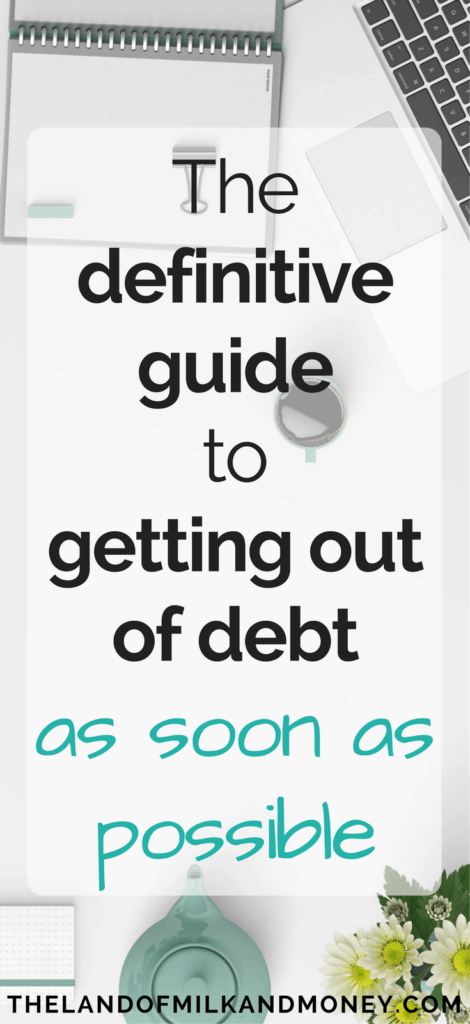
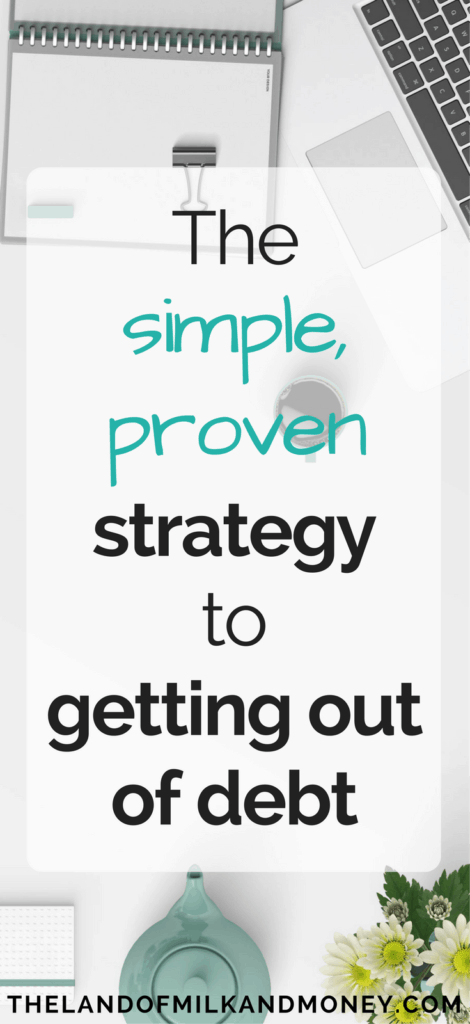
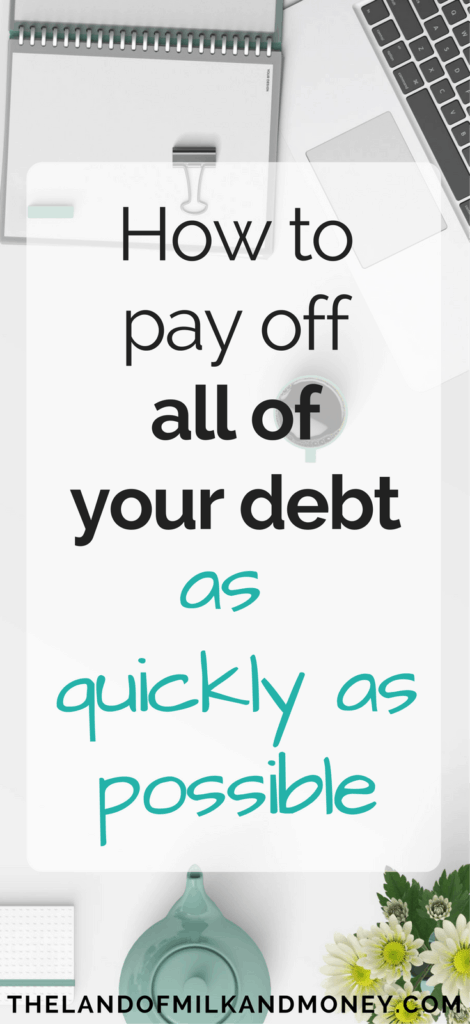
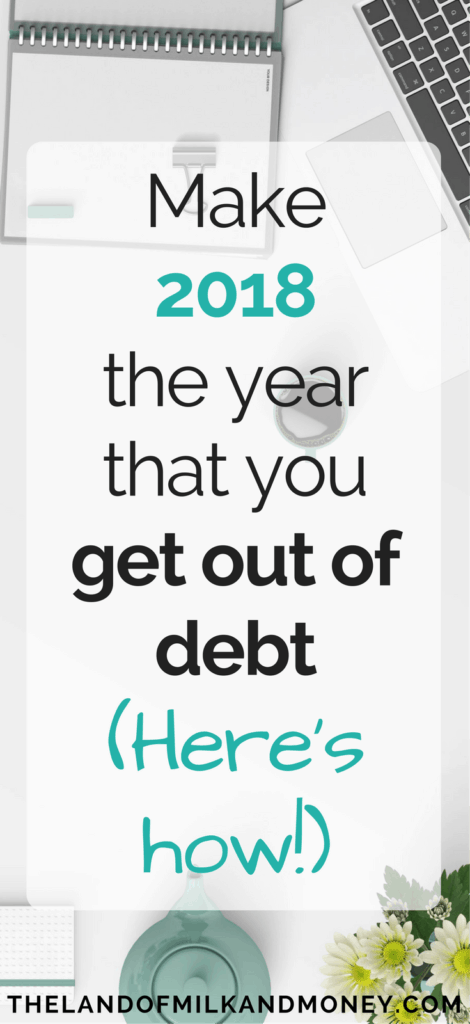
8 comments
2018 WILL be my year to get debt free. 🙂 Thanks for the article!
Absolutely! Let me know when you make it – I’ll be popping some champagne for you! 🙂
I’ll be debt free by June with the debt avalanche I can’t wait then start saving at least half the money i was paying into my debt into 401K to set up for my future
That’s seriously amazing – I can’t emphasise enough how excellent it is that you’re going to be debt-free in only a few months! Future you is definitely grateful!
Good blog you’ve got here.. It’s difficult to find high-quality writing like yours nowadays.
I really appreciate individuals like you! Take care!!
Thanks so much – and you too!
I agree that changing your thinking is #1! If you keep the same mindset then you’ll keep the same spending habits. Sadly, I hadn’t no idea what interest rates were before my first auto loan. Man I was in for a surprise when I was throwing loads of money towards the loan but the balance barely moved.
Argh, absolutely. I still remember diligently making the minimum repayments on my car loan back in the day, smugly checking the balance a few months in thinking how good I was to be getting out of debt…and the amount was pretty much the same as when I started! Talk about a wake up call…